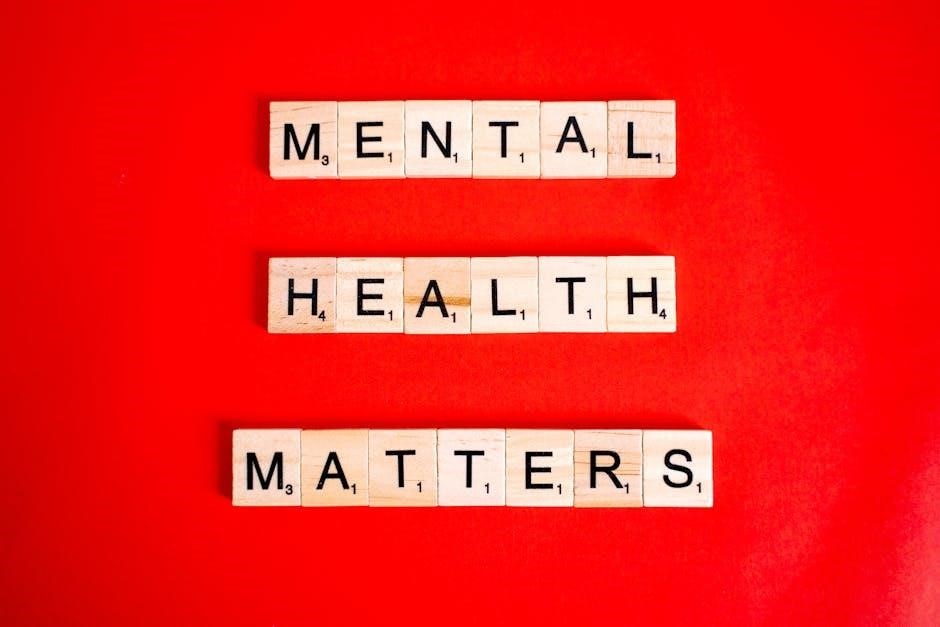mental health maintenance plan pdf
A mental health maintenance plan is a proactive approach to managing mental well-being, outlining strategies for self-care, recognizing triggers, and seeking support when needed․ It serves as a personalized guide to maintaining emotional stability and resilience, ensuring long-term mental health care through daily activities and structured coping mechanisms․
What is a Mental Health Maintenance Plan?
A mental health maintenance plan is a personalized guide to managing mental well-being proactively․ It outlines daily activities, self-care practices, and coping strategies to maintain emotional stability․ The plan identifies triggers, warning signs, and actionable steps to address them․ It also includes strategies for seeking professional help when needed and crisis management․ This structured approach ensures individuals can sustain mental health over time, fostering resilience and emotional balance․ Regular updates and reviews are encouraged to adapt to changing needs and circumstances․
Why Create a Mental Health Maintenance Plan?
Creating a mental health maintenance plan is essential for proactive self-care and long-term well-being․ It helps identify triggers, develop coping strategies, and establish routines to prevent mental health challenges; By outlining daily activities and self-care practices, individuals can maintain emotional balance and resilience․ The plan also guides when to seek professional support and how to manage crises effectively․ Regular updates ensure adaptability to life changes, promoting sustained mental health and reducing the risk of relapse․ This structured approach empowers individuals to take control of their mental health, fostering a positive and stability-focused lifestyle․

Identifying Triggers and Warning Signs
Triggers are events or situations that can cause mental health challenges, while warning signs are indicators of potential relapse․ Recognizing these helps in early intervention and better management․
Common Triggers for Mental Health Issues
Common triggers include stress, trauma, significant life changes, or unhealthy relationships․ Environmental factors like lack of sleep or poor nutrition can also contribute․ Emotional triggers, such as feelings of rejection or failure, may exacerbate mental health challenges․ Identifying personal triggers is crucial for creating effective coping strategies and maintaining emotional well-being․ By understanding these triggers, individuals can develop targeted approaches to manage their mental health proactively․
Early Warning Signs of Mental Health Challenges
Early warning signs of mental health challenges may include mood swings, increased irritability, or withdrawal from social activities․ Changes in sleep patterns, appetite, or energy levels can also signal potential issues․ Difficulty concentrating, persistent sadness, or heightened anxiety are additional indicators․ Recognizing these signs early allows individuals to implement coping strategies or seek support before symptoms escalate․ Awareness of these warning signs is key to maintaining mental well-being and preventing more severe challenges from developing․

Self-Care Strategies for Mental Health

Self-care strategies include mindfulness practices, regular exercise, and engaging in activities that bring joy and relaxation, helping to maintain emotional balance and overall mental well-being․
Daily Activities to Boost Mental Health
Daily activities play a crucial role in maintaining mental well-being․ Engaging in mindfulness practices, such as meditation or deep breathing, can reduce stress․ Regular physical exercise, like walking or yoga, improves mood and energy levels․ Incorporating hobbies or creative pursuits, such as painting or reading, fosters joy and fulfillment․ Healthy eating habits and adequate sleep are also essential for emotional balance․ Connecting with loved ones or pets enhances a sense of belonging and support․ Consistently practicing these activities helps build resilience and promotes long-term mental health stability․
Importance of Routine and Consistency
Establishing a consistent daily routine is vital for mental health stability․ It provides structure, predictability, and a sense of control, reducing anxiety and uncertainty․ Routine helps build healthy habits, such as regular sleep schedules, balanced meals, and timely exercise, which are foundational to emotional well-being․ Consistency also reinforces self-care practices, ensuring they become ingrained and sustainable over time․ By maintaining a steady rhythm in life, individuals can better manage stress, improve focus, and enhance overall mental resilience, fostering long-term stability and emotional balance․

Coping Strategies for Mental Health Maintenance
Coping strategies are essential for managing stress and emotions proactively․ Techniques like mindfulness, grounding, and problem-solving help individuals navigate challenges effectively, promoting emotional balance and resilience․ Consistent practice of these methods enhances mental well-being and equips individuals to handle life’s difficulties with greater ease and confidence․
Emotional Regulation Techniques
Emotional regulation techniques are vital for managing feelings effectively․ Practices like mindfulness, grounding, and deep breathing help calm the mind and reduce stress․ Journaling and self-reflection allow individuals to identify and process emotions constructively․ These methods enable better control over emotional responses, fostering stability and reducing overwhelm․ By incorporating these strategies into daily routines, individuals can enhance their ability to handle challenges and maintain mental balance․ Regular practice strengthens emotional resilience, promoting overall mental well-being and reducing the risk of mental health challenges․
Practical Problem-Solving Strategies
Practical problem-solving strategies are essential for addressing challenges effectively․ Start by identifying the issue, brainstorming potential solutions, and selecting the most feasible option․ Break problems into smaller, manageable steps to reduce overwhelm․ Practice active decision-making and evaluate outcomes to refine approaches․ Incorporate coping strategies, such as seeking support or using relaxation techniques, to manage stress during problem-solving․ Regularly reviewing and adjusting these strategies ensures adaptability and resilience․ These methods empower individuals to tackle difficulties confidently, fostering mental well-being and strengthening their ability to maintain emotional balance․

Knowing When to Seek Professional Help
Recognizing when self-care efforts are insufficient is crucial․ Seek professional help if symptoms persist, worsen, or significantly impact daily life, ensuring timely intervention for mental well-being․
Recognizing the Need for Support
Recognizing when to seek support is vital for maintaining mental health․ Pay attention to persistent symptoms like overwhelming emotions, strained relationships, or declining daily functioning․ If self-care routines and coping strategies are no longer effective, it may indicate the need for professional intervention․ Early recognition of these signs prevents further deterioration and promotes timely recovery․ Acknowledging personal limits and reaching out for help is a proactive and courageous step toward mental well-being․ Professional guidance, such as therapy or counseling, can provide tailored strategies to address specific challenges and improve emotional resilience․
How to Find the Right Mental Health Resources
Finding the right mental health resources involves exploring trusted options tailored to your needs․ Start by researching local mental health clinics, online therapy platforms, and support groups․ Utilize hotlines and helplines for immediate assistance․ Professional referrals from doctors or trusted organizations can guide you to reliable services․ Consider online directories or apps that connect users with licensed therapists․ Ensure the resources align with your specific challenges and preferences, offering accessibility and confidentiality․ Seeking recommendations from trusted sources can help narrow down choices, ensuring you find the most suitable support for your mental well-being journey․

Crisis Planning and Management
Crisis planning involves creating a detailed action plan to manage mental health emergencies, including identifying triggers, outlining coping strategies, and establishing a support network for immediate assistance․
Creating a Crisis Action Plan
A crisis action plan is a detailed strategy to manage mental health emergencies effectively․ It outlines specific steps to take during a crisis, such as identifying triggers, listing emergency contacts, and defining coping techniques․ The plan should include practical solutions for immediate situations, like contacting a therapist or reaching out to a support network․ It also specifies when professional intervention is necessary, ensuring quick access to help․ By preparing this plan, individuals can respond calmly and confidently, reducing the risk of escalation and promoting faster recovery․ Regular updates ensure relevance and effectiveness․
Post-Crisis Recovery Strategies
Post-crisis recovery involves rebuilding stability and emotional well-being after a mental health emergency․ It includes reflecting on the crisis to identify triggers and effective coping strategies․ Self-care activities, such as mindfulness exercises, healthy eating, and rest, are essential to restore balance․ Reconnecting with a support network and engaging in meaningful activities can foster resilience․ Updating the crisis action plan with new insights ensures better preparedness for future challenges․ Recovery is a gradual process, requiring patience and self-compassion to rebuild mental health and regain control over daily life․ Celebrating small progress helps sustain motivation and promotes long-term well-being․

Maintaining Long-Term Mental Health
Maintaining long-term mental health requires a balance of self-care, consistent routines, and a strong support network․ Regularly reviewing and updating your mental health plan ensures adaptability to life changes, fostering resilience and emotional well-being over time․ Incorporating personal growth activities and healthy habits supports sustained mental wellness․
Regular Review and Update of the Plan
Regularly reviewing and updating your mental health maintenance plan ensures it remains relevant and effective․ Life changes, new challenges, and personal growth can impact your needs․ Schedule periodic assessments, ideally every few months or after significant life events, to evaluate progress and adjust strategies․ This process allows you to refine goals, incorporate new coping techniques, and strengthen support systems․ Keeping the plan updated helps maintain accountability and adaptability, ensuring long-term mental wellness․ It also fosters resilience by addressing emerging issues before they escalate, promoting sustained emotional and psychological well-being․
Building a Support Network
A strong support network is essential for maintaining mental health․ Identify trusted individuals, such as family, friends, or mental health professionals, who can provide emotional backing and practical assistance․ Include their contact details in your plan for easy access during challenging times․ Regular communication with your support network helps foster a sense of connection and reduces feelings of isolation․ Additionally, consider joining community groups or online forums to expand your support system and gain diverse perspectives․
Building a support network ensures you have a reliable safety net to lean on during crises or everyday stress, promoting overall well-being and resilience․

A mental health maintenance plan is a vital tool for proactive care, fostering resilience and emotional well-being through self-awareness, support networks, and strategic coping mechanisms․
The Importance of Proactive Mental Health Care
Proactive mental health care is essential for preventing crises and fostering long-term well-being․ By identifying triggers, practicing self-care, and building resilience, individuals can maintain emotional balance․ Early intervention and a structured maintenance plan reduce the risk of relapse, ensuring stability and quality of life․ Prioritizing mental health through daily routines and support networks enhances overall wellness, empowering individuals to navigate challenges effectively and sustain a positive mental state․

